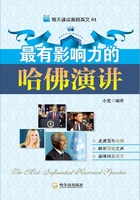
第3章 Inequity and Complexity of the World 世界的不公和复杂(3)
Thirty years after Marshall made his address, as my class graduated without me, technology was emerging that would make the world smaller, more open, more visible, less distant.
The emergence of low-cost personal computers gave rise to a powerful network that has transformed opportunities for learning and communicating.
The magical thing about this network is not just that it collapses distance and makes everyone your neighbor. It also dramatically increases the number of brilliant minds we can have working together on the same problem-and that scales up the rate of innovation to a staggering degree.
At the same time, for every person in the world who has access to this technology, five people don‘t. That means many creative minds are left out of this discussion-smart people with practical intelligence and relevant experience who don’t have the technology to hone their talents or contribute their ideas to the world.
We need as many people as possible to have access to this technology, because these advances are triggering a revolution in what human beings can do for one another. They are making it possible not just for national governments, but for universities, corporations, smaller organisation, and even individuals to see problems, see approaches, and measure the impact of their efforts to address the hunger, poverty, and desperation George Marshall spoke of 60 years ago.
Members of the Harvard Family: Here in the Yard is one of the great collections of intellectual talent in the world.
What for?
There is no question that the faculty, the alumni, the students, and the benefactors of Harvard have used their power to improve the lives of people here and around the world. But can we do more? Can Harvard dedicate its intellect to improving the lives of people who will never even hear its name?
Let me make a request of the deans and the professors-the intellectual leaders here at Harvard: As you hire new faculty, award tenure, review curriculum, and determine degree requirements, please ask yourselves:
Should our best minds be dedicated to solving our biggest problems? Should Harvard encourage its faculty to take on the world‘s worst inequities? Should Harvard students learn about the depth of global poverty ... the prevalence of world hunger ... the scarcity of clean water ...the girls kept out of school ... the children who die from diseases we can cure?
Should the world’s most privileged people learn about the lives of the world‘s least privileged?
These are not rhetorical questions-you will answer with your policies. My mother, who was filled with pride-the day I was admitted here-never stopped pressing me to do more for others. A few days before my wedding, she hosted a bridal event, at which she read aloud a letter about marriage that she had written to Melinda. My mother was very ill with cancer at the time, but she saw one more opportunity to deliver her message, and at the close of the letter she said: “From those to whom much is given, much is expected.”
When you consider what those of us here in this yard have been given- in talent, privilege, and opportunity-there is almost no limit to what the world has a right to expect from us.
In line with the promise of this age, I want to exhort each of the graduates here to take on an issue-a complex problem, a deep inequity, and become a specialist on it. If you make it the focus of your career, that would be phenomenal. But you don’t have to do that to make an impact. For a few hours every week, you can use the growing power of the Internet to get informed, find others with the same interests, see the barriers, and find ways to cut through them.
Don‘t let complexity stop you. Be activists. Take on the big inequities. It will be one of the great experiences of your lives.
You graduates are coming of age in an amazing time. As you leave Harvard, you have technology that members of my class never had. You have awareness of global inequity, which we did not have. And with that awareness, you likely also have an informed conscience that will torment you if you abandon these people whose lives you could change with very little effort. You have more than we had; you must start sooner, and carry on longer.
Knowing what you know, how could you not?
And I hope you will come back here to Harvard 30 years from now and reflect on what you have done with your talent and your energy. I hope you will judge yourselves not on your professional accomplishments alone, but also on how well you have addressed the world’s deepest inequities ... on how well you treated people a world away who have nothing in common with you but their humanity.
Good luck.
汉语回放(鲁耀译)
尊敬的博克校长,鲁登斯汀前校长,即将上任的弗斯特校长,哈佛集团的各位成员以及监管理事会的理事,在座的教师们、家长们,尤其是在座的学生们:
等了整整30年后,我终于可以说出这句话了:爸,我告诉过你,我会回来拿我的学位的。
我要感谢哈佛大学此时给予我的荣誉。明年,我要换工作了……拿到这个大学学历证对于我的简历来说真是不错。
我为今年的毕业生鼓掌,祝贺你们能以一种直接的方法拿到你们的学位。就我而言,我很乐意听到哈佛校报称呼我为“哈佛大学最成功的辍学者”。这使我成为与我同样的这一特殊群体的毕业演说人的代表……因为我是辍学者当中混得最成功的。
但是我也想让大家知道我就是使斯蒂夫·鲍尔默从商学院退学的那个人,我是一个有恶劣影响的人。这也是我被邀请给你们作毕业演讲,而不是作入学演讲的原因。如果是那样,今天这里的听众可能会很少。
哈佛大学的学习经历对我来说只是一场非凡的人生经历。学校生活是有趣的,我以前常常去旁听我没有选修的课。哈佛的课外生活也非常棒,我住在雷德克里夫宿舍楼,常常会有很多人在我的宿舍讨论各种各样的事情,一直到深夜。因为大家知道我从不早起,这使我成为学校里非主流群体的领头人。我们聚在一起,以此表明我们对主流群体学生的抗拒。
雷德克里夫宿舍楼是个生活的好地方。那里的女生比较多,并且大部分的男生都是理科生,这种状况为我提供了很好的机会,你们明白我的意思。但是同样是在这里,我得到了一个惨痛的教训,就是:有机会不一定会成功。
我在哈佛大学里印象最深刻的事发生在1975年1月,当时我从宿舍楼里给位于阿尔布开克的一家公司打电话,这家公司当时已经开始制造世界上第一台个人电脑,我提出向他们销售软件。